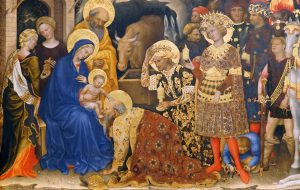Words on the Word
Epiphany
The protagonists of today’s feast are the wise men from the East and the Child in the manger. Their encounter has been so amply developed in poetry and art that it seems to us deeply familiar. The Magi’s oriental majesty, their splendid capes and headgear and precious gifts, lend extravagance to Christmas. We are right to rejoice in all this loveliness. God has assumed our nature. He takes it seriously, also in its sensuous and imaginative aspects. Everything kan become praise.
The scene from Bethlehem fulfils the vision of Isaiah: ‘The nations come to your light and kings to your dawning brightness.’ This promise is realised before our eyes. It is wonderful: God prepares our salvation by means of a scenography conceived in minute detail so as to give us reliable signs by which we may ascertain its accomplishment. Now the hour has come.
We rejoice in the radiance that issues from the manger. Full daylight, however, is more than we can bear. John says it categorically: ‘The light came into the world, but men preferred darkness to the light.’ That remains the case to this day. Through the gentleness and sweetness of Christmas blows a cold wind of rejection.
God knew it would be like this. The same Isaiah who prophesied Christ’s epiphany foresaw all that the Lord’s Suffering Servant would have to endure to enact his mission: ‘He was rejected, despised by people, a man of sorrows; one before whom people hide their faces, despised. And we counted him for nothing.’ The Child in the Manger is the Lamb of God. Above the stable roof we see the outline of a Cross.
It is a noble tradition that the Church, on this thirteenth day of Christmas, proclaims the date of Easter. We are reminded that God became man, not to create an atmosphere, but to engage, on our behalf, in battle against sin and death. We know what it cost him. Let’s be mindful of that when we kneel, alongside Melchior, Balthasar and Casper, before Mary’s Child. In the gifts offered by the three, the Church recognises mystical signs of Jesus’s passion and death.
In a hymn by Thomas Kingo we sing of ‘Joy and grief proceeding hand in hand‘. In the face of Jesus the two are one. We are reminded that life is like this. We needn’t fear the admixture. We needn’t rebel against it. What matters is to know that all has been born by our loving Saviour in order, next, to assume our part in his bearing, each of us according to our own special call.
The dawn Isaiah foresaw points towards the day. Let us choose what is of the day, putting behind us all that belongs to the night. God, who is Light, has come to make us light. That, too, is part of what Isaiah saw.
After worshipping the Son of God, the Magi returned to their homeland ‘by another way’. Their choice was pragmatically motivated: the angel had warned them of Herod’s plots. However, there is also deep symbolic truth in their new itinerary. An encounter with Jesus is transformative. One isn’t the same afterwards; it no long seems right to keep on walking the way one walked before. We yearn for something else on which we may struggle to put our finger.
To be a Christian is to live in this state of otherness, constantly looking for the right way. The Way, of course, has a name, a face. It reveals itself to us to us on Mary’s lap and here on this altar. Let us follow the Way with joy, faithfully, grateful for the fellowship we have in one another.

